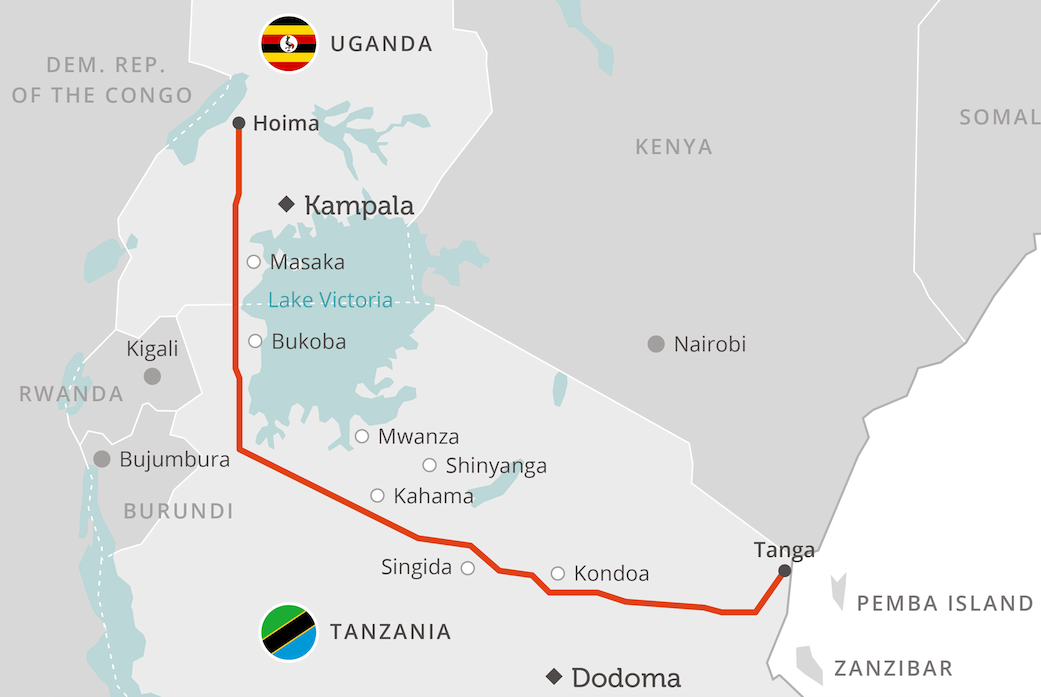- Hundreds of environmental and community activists staged peaceful protests at the corporate headquarters of some Chinese banks and insurance firms, as well as Chinese embassies across Africa, Europe and North America today, demanding those institutions commit not to support further development of the controversial East African Crude Oil Pipeline (EACOP).
Actions have been organized by local civil society and community-based organizations working alongside people who have been or will be directly and indirectly impacted by EACOP and the associated upstream oil projects in Uganda, Tanzania and the Democratic Republic of the Congo (DRC). They are taking place in Kampala (Uganda), Dar es Salaam (Tanzania), and Kinshasa (DRC), with solidarity actions happening in Tshwane (South Africa), Paris (France), New York (USA) and London (UK). On Friday, 17th November, another action, led by the Ugandan Diaspora community, took place at the Chinese Embassy in Washington, D.C. (USA). Hundreds of people worldwide have also participated in online actions in parallel with the peaceful protests.

East African Crude Oil Pipeline map. Image credit: EACOP
Affected people who oppose EACOP have turned their focus to China and Chinese financial institutions following reports that they are considering stepping in to back EACOP after numerous North American, European and Japanese banks and insurers have committed not to do so, citing climate, environmental and human rights concerns. StopEACOP and allied activists are urging China and Chinese firms not to be a “last resort” for a project with such a devastating social and environmental impact on Africa. Today’s actions are focused specifically on the state-owned China Export & Credit Insurance Corporation (SINOSURE), the Export-Import Bank of China (China Exim), and the Industrial and Commercial Bank of China (ICBC), institutions that have been reported to be likely get involved with the pipeline project. Affected people and their allies have reached out to these firms and other Chinese banks in the past to alert them to their concerns about the project, but they have never received a response.
At each action, the groups set out to deliver petitions signed by thousands of directly impacted citizens opposed to the planned 1443 km heated pipeline. Other documents, including expert analysis outlining the environmental and socio-economic impacts of EACOP, were also prepared for delivery to the relevant entities. Unfortunately, officials from the Chinese Embassies in Uganda and South Africa refused to receive the documents, despite a prior commitment made by the Embassy in South Africa that they would come down to accept the aforementioned materials. In Kampala, seven activists were arbitrarily arrested and have now been detained at the Jinja Road Police Station. This forms part of the ongoing suppression of Ugandan citizens’ right to protest and the consistent brutalisation of activists who seek to assert their opposition to the harmful EACOP project.
If completed, the pipeline would extend from Hoima, Uganda, to Tanga, Tanzania. It is expected to transport oil from two oil fields in Western Uganda and may eventually connect to oil blocks in the Democratic Republic of Congo. The controversial EACOP project threatens pristine ecosystems, biodiversity hotspots, water resources and community lands, and the project would lead to an estimated 379 million tonnes of CO2 emissions, contradicting global climate goals.
The day of action is part of escalating tactics to block EACOP, including lawsuits, shareholder advocacy, policy engagement and civil disobedience. In the lead-up to the COP28 summit, EACOP-affected people and their allies vowed not to stand by as the controversial pipeline locks the East Africa region into decades of expanded fossil fuel extraction that destroys biodiversity and local livelihoods.
Author: Bryan Groenendaal















